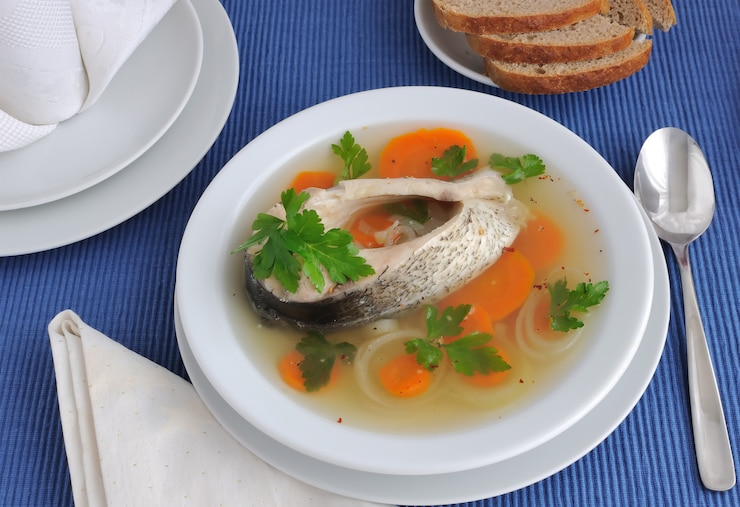A subtly robust soup from Russia has made a comeback with new significance in a culinary age that is becoming more and more influenced by sustainable practices and dietary mindfulness. Traditionally made with fish heads and root vegetables, Ukha (уƅa) is a very clear fish and vegetable broth that is not only a product of tradition but also a masterwork of simplicity and practicality. Ukha depends on its core components—whole ingredients, a methodical approach to flavor extraction, and time-tested technique—much like a violin solo in an era of electronic cacophony.
Ukha was first prepared from wild game in the eleventh century. By the fifteenth century, it had evolved into a fish-based broth, and in the seventeenth century, it gained recognition at aristocratic feasts. These days, it works incredibly well to demonstrate that deeply nourishing food only requires patience and purpose—not luxury.
Russian Fish and Vegetable Clear Soup (Ukha)
| Dish Name | Ukha – Russian Fish and Vegetable Clear Soup |
|---|---|
| Region of Origin | Russia (with influence from Ukraine and Eastern Europe) |
| Core Ingredients | Fish heads or fillets, carrots, onions, potatoes, bay leaves, dill |
| Traditional Spices | Allspice, peppercorns, bay leaves, vodka (for broth clarity) |
| Preparation Time | 1.5–2 hours (or 30 minutes using an Instant Pot) |
| Serving Suggestion | Hot or cold, garnished with herbs and lemon, served with crusty bread |
| Culinary Feature | Vodka used for clear broth, not flavor |
| Shelf Life | 4 days in fridge, up to 3 months in freezer |
| Reference Site | Russia Beyond – Ukha |
A Traditional Soup with a Forward-Looking Attitude
Ukha is distinguished not only by its distinct flavor profile but also by its resource-conscious ethos. Root-to-stem and fin-to-scale cooking are becoming increasingly valued in society, and this soup feels a lot like modern zero-waste cooking. Ukha reflects a growing change in our perception of food value by transforming fish heads and bones—parts that are frequently thrown away—into tasty broth.
Ukha creates a very clear broth that is subtly aromatic but surprisingly rich by simmering fish bones slowly and avoiding rolling boils. Just before serving, an optional dash of vodka is added, but it has no effect on the flavor. Rather, it serves as a clarifying agent to help separate proteins during the simmering process, producing a lovely, translucent finish.
The Development of Ukha from Campfires to Countertops
Ukha is traditionally made over open flames in clay pots outdoors, but it now works remarkably well with contemporary cooking appliances like the Instant Pot. For health-conscious professionals looking for comfort food without sacrificing quality, the pressure-cooked version is an enticing alternative because it is much quicker to prepare while maintaining all of its character.
It’s also a very adaptable soup. Home cooks can use trout, salmon, perch, or even white fish like pike, depending on the area or what’s available. While parsley and dill add aromatic lift, root vegetables like potatoes and carrots provide body. Celery, pickled cabbage, or spicy horseradish are even used in some variations, proving the dish’s versatility for both palates and kitchens.
A Broth That Overcomes Tables and Seasons
Most soups follow seasonal boundaries, but ukha doesn’t. It provides comfort in any climate, whether it is served hot in the dead of winter or cold on a sweltering summer day. Ukha acts as a sensory link between traditional and modern living for those who are interested in trying out international comfort foods or who are nostalgic for meals by the lake at rustic cottages.
With only lemon wedges, herbs, and frequently a slice of hearty rye or sourdough bread, the serving ritual is purposefully simple. It grounds us in an eating rhythm that is as healing as the broth itself, inviting us to take our time and enjoy every bite.
Especially Good for the Budget and the Body
Ukha is very effective in terms of nutrition; it is low in fat, high in protein, and full of minerals that are extracted during the lengthy simmer. It offers a healthy, nutritious alternative to cream, butter, or thickeners for people watching their calorie intake or looking for digestive balance. It is also accessible due to its surprisingly inexpensive ingredients, which is crucial in an era of rising food insecurity and health-conscious eating.
Along with other international broths like Vietnamese pho, Japanese miso, or French bouillon, ukha is culturally comparable and offers a comforting, Slavic-specific flavor.
Reimagining Tradition: The Significance of Ukha in the Present
Ukha is particularly remarkable because it can change without losing its core qualities, which is what gives it its longevity. The soup remains popular whether it is dressed up with saffron for a special occasion or reduced to its most basic form. It is a way to cook more mindfully, eat better, and waste less, and it is both an ancient recipe and a contemporary tactic.
Russian ukha not only satisfies the body but also serves as a reminder that the most profound culinary concepts are frequently the most modest ones, thanks to its thoughtful preparation, seasonal adaptability, and classic simplicity.



1 Comment
Your point of view caught my eye and was very interesting. Thanks. I have a question for you. https://accounts.binance.com/ro/register?ref=HX1JLA6Z